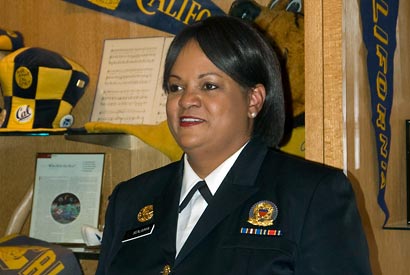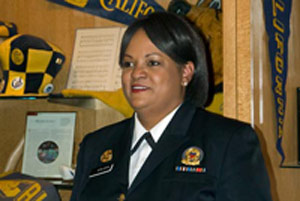Look to overweight, not overseas, for source of U.S. health problems, says surgeon general
U.S. Surgeon General Regina Benjamin came to Berkeley's Alumni House Thursday to deliver her “vision of a healthy and fit nation.” But the day’s most burning health question, at least in the minds of the news media gathered at her subsequent press conference, was this: Should people be worried about radiation from Japan’s ongoing nuclear crisis? Her answer: "No."

March 17, 2011
U.S. Surgeon General Regina Benjamin came to Berkeley’s Alumni House Thursday to deliver her “vision of a healthy and fit nation.” But the day’s most burning health question, at least in the minds of the news media gathered at her subsequent press conference, was this:

Should people be worried about radiation from Japan’s ongoing nuclear crisis?
“No, they should not be fearful,” Benjamin declared. Radiation experts, she said, “have told us that harmful levels of radiation are not going to reach the United States or our territories, so there’s no reason to be fearful.”
Clarifying comments she made yesterday in San Francisco, the official billed as “America’s top doctor” said, “There is no reason to go out and buy or stockpile or start to take potassium iodide… You only do that when you’re at immediate risk and that immediate risk is not here now.”
If there ever is reason for concern, she added, government agencies monitoring the situation “will certainly get that message out to you very quickly. But right now you’re not at risk.”
The subject never came up in Benjamin’s 35-minute talk, which was sponsored by the School of Public Health and the College of Natural Resources. The surgeon general put Berkeley on her public-speaking itinerary at the invitation of Dr. Pamela Peeke, a Maryland physician who earned her B.S. from CNR and her master’s from the School of Public Health before going on to medical school. Peeke introduced Benjamin.
But first, public health dean Steve Shortell welcomed Benjamin both for her work improving health practices in vulnerable communities and as someone who “epitomizes the values that our school shares and the campus at large — of diversity, equity and inclusion, social justice and improving health for all.”
Before heading to Washington to serve in the Obama administration, Benjamin founded and ran the Bayou Le Batre clinic in a tiny, poor Alabama fishing village, rebuilding after the ravages of two hurricanes (George in 1998, Katrina in 2005) and then a fire. Her work has won her multiple national honors, including a MacArthur fellowship.
Coming to Berkeley, with its tradition of free thinking, cultural diversity and political activism, was a dream come true, she said, because those attributes are “really what we need … to find a way to become a more healthy and fit nation.”
Using down-to-earth examples from her clinic in Bayou Le Batre, Benjamin laid out her health priorities for the nation.
Obama’s health-insurance reform was historic and long overdue, she said, but “reducing health disparities is going to require more than an insurance card.”
“We have to address poverty,” she said, calling it a bigger killer than smoking — though that’s also on her list.
Her first report as surgeon general, her “Vision for a Healthy and Fit Nation,” tackles the issue of obesity and overweight by advocating a cultural change that elevates the role of exercise as an everyday value. People are tired of being told what they can’t eat, or what they can’t do, she said.
““I’m trying to change a negative conversation about being obese and overweight to a positive conversation,” Benjamin said.
She cited First Lady Michelle Obama’s “Let’s Move” campaign as a good example, and she’s staged group walks of doctors and healthcare workers in several cities to show people how simple the idea of moving is. Benjamin, who has felt the heat of public criticism about her own extra poundage, even invited television cameras to follow her on a hike from one rim of the Grand Canyon to the other to show that “if I can do it, anyone can.”
Other priorities: support for breastfeeding mothers, HIV/AIDS (“people forget, because we have drugs to treat it, that people are still dying,” she said), mental health services and prevention.
Advocating a holistic approach to health, which takes into account everything from food to highway safety to the environment, Benjamin said her goal is “to get to the place where people understand that everything we do affects the quality of health and life for all Americans.”
At the end of her talk and before facing the press, Benjamin answered questions from the audience on subjects including menthol in cigarettes, the shortage of African American physicians and the pressure to be thin.
After her campus visit, Benjamin headed off to the Faculty Club for lunch with faculty members, and then a visit to the Edible Schoolyard at Berkeley’s Martin Luther King Jr. Middle School.